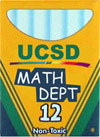 Getting Started >
Dealing with Exams >
Proctoring
Getting Started >
Dealing with Exams >
Proctoring
|
Proctoring is pretty straightforward, really. You're there primarily to answer questions (equitably!) and discourage cheating. As such, it's not meant to be a time for you to finish last week's crossword. Instead, you should do the following:
- Sweep the room with your eyes and stare down students whose eyes seem to be wandering.
- Move around the room from time to time to gain different perspectives.
- Make mental notes of possibly suspicious behavior; you may wish to relocate multiple offenders to the front row.
- Be especially vigilant at the end of the exam period when things get a little hectic. Help your professor control the crowd, while continuing to watch students in the back of the room.
If you suspect someone of cheating, tell your professor (who should really be in the room with you, or at least close at hand). He or she will make the call about what to do next. (see Policies > Academic Dishonesty )
Note that your professor may not need a proctor for every exam, or may only need one rather than his entire team of TAs. You should ask you professor about this well in advance. In any case, proctoring is ultimately your responsibility. (See the department policy on proctoring and class conflicts.)
|
 Getting Started >
Dealing with Exams >
Proctoring
Getting Started >
Dealing with Exams >
Proctoring
